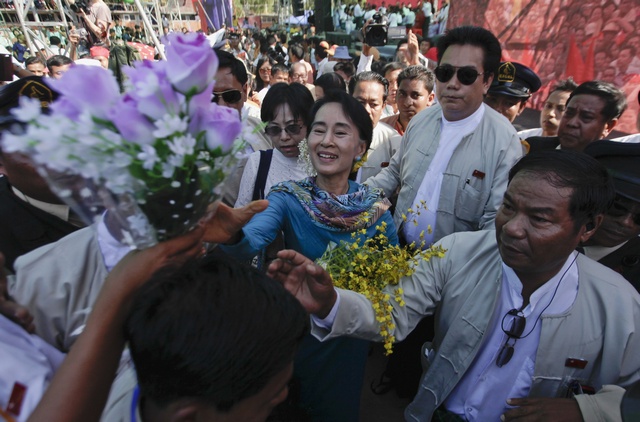Opposition leader Aung San Suu Kyi has criticised a provision in Burma’s controversial 2008 constitution, which prohibits her from becoming president in 2015 because her family members are foreign citizens.
Speaking to journalists on Wednesday, the democracy icon, who was married to a British man and has two sons with foreign citizenship, insisted she should be allowed to run for president.
“A constitution should be drawn based on principles of right and wrong and not based on individual gain. I’ve been saying this for a long time; this provision was never included in Burma’s constitution before and I take it that it was included in this one on purpose. Adopting a constitution with [an agenda] is an inappropriate thing to do.”
She has previously said that she wants to secure the presidency. “Yes I want to have power,” she told a crowd of people in December. “I desire power so that I can work for the people.”
Suu Kyi was famously denied power by the military in the 1990 elections, which her party won by a landslide, on the dubious premise that Burma lacked a constitution. Analysts say the exclusion clause of the new legislation was specifically drafted with her in mind.
But the democracy champion, who spent nearly two decades under house arrest in Rangoon, has also vowed to forgive the crimes of the past. On Wednesday, she defended her party, the National League for Democracy (NLD), over allegations it had secured funding from some former regime cronies.
“I dislike politics that are based on personal grudges,” she told reporters in Naypyidaw. “If the cronies support the NLD and other charitable organisations, then let them. Instead of using their money for something wasteful, they are using it to support those in need – it is a very nice thing.”
“I don’t think about whether they intend to charm the NLD or other groups, but only about how they are contributing to the people and the democratic reforms.”
It followed criticisms that the NLD charitable arm had accepted donations from Sky Net, Air Bagan and AGD Bank totaling over 200 million kyat (US $235,000).
Suu Kyi, a long-time supporter of economic sanctions against the regime and its cronies, was released from house arrest shortly after the flawed 2010 general election. Since then she has come to work closely with President Thein Sein, who is credited for introducing sweeping democratic reforms in the country.
But Burma’s constitution guarantees the military a heavy hand in public affairs, including 25% of seats in parliament. Suu Kyi would need the support of at least 75% of the parliament in order to amend the constitution – a task which analysts have described as unlikely to happen before the next general election in 2015.



